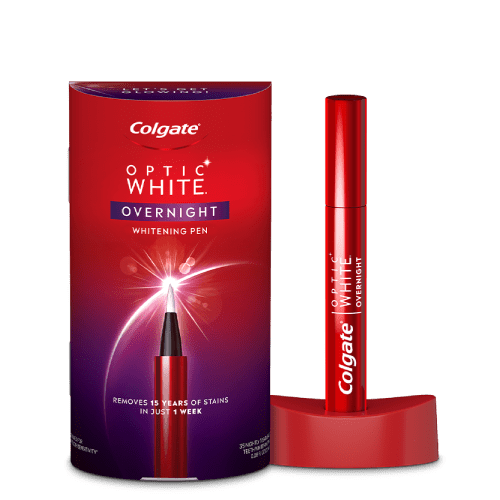How Do Whitening Gels Work?
It's natural to be curious or concerned about what's in dental whitening gel and how it works. Whitening gels have gentle bleaching agents to safely whiten the teeth, along with several other added ingredients to improve the product's performance and flavor. Let’s break down what’s in a whitening gel and why…
Common Ingredients in Whitening Gels
- The bleaching agent. Hydrogen peroxide is a common bleaching agent used in whitening gels. It penetrates enamel and interacts with the pigments that cause stains, changing their chemical structure to remove discoloration. The American Dental Association (ADA) states that hydrogen peroxide helps remove surface stains, as well as deep discoloration in your teeth. Another common ingredient often used in dental whitening gels is carbamide peroxide, which breaks down to release hydrogen peroxide when it comes into contact with water.
- Other ingredients. Many teeth whiteners include added ingredients to help decrease tooth sensitivity. Two common whitening gel ingredients are potassium nitrate and amorphous calcium phosphate, both shown to reduce sensitivity. However, sensitivity after whitening is usually temporary, according to the ADA.
Slow-Acting vs Quick-Acting Whitening Gels
Dentists can apply whitening gel to your teeth in the office, or provide you with a slower-acting gel and trays to take home. Quick-acting whitening gels that dentists use in-office contain higher concentrations of hydrogen peroxide, typically between 15% and 38%. This makes the process faster than at-home whitening, but can also cause more sensitivity.

Overnight Whitening Pen
A teeth whitening pen with an enamel safe whitening serum formula designed for no tooth sensitivity.

Who Can Use Whitening Gel?
Dental whitening gels lighten teeth and remove stains effectively, but they aren't for everyone. The American Academy of Pediatrics says parents should wait until all of a child's baby teeth have fallen out before whitening.
Regardless of age, it's best for everyone to consult their dentist before using a whitening gel. Teeth with very dark stains, crowns or fillings might not have good results from over-the-counter dental whitening gel products. Your dentist can advise the best way forward. Be sure to carefully read the product label and follow all instructions given by the manufacturer or your dentist.
How to Use Whitening Gel at Home
Before using a tooth whitening gel, see your dentist. They can make a custom tray to fit neatly with the contours of your mouth and explain how to properly use a gel. Depending on the product, you may need to wear the tray for a few hours during the day or overnight. Your dentist might recommend using the mouth tray for about two weeks to get the desired results. Your dentist should also advise you to:
Brush your teeth before applying the treatment gel.
Wipe away any gel that spills from the trays and comes into contact with your gums.
Be careful not to swallow any gel.
Gently remove any residue that might be left on your teeth or gums with a cloth, a clean finger or a soft toothbrush.
Rinse your mouth thoroughly after treatment.
How Much Whitening Gel Should You Use?
Your dentist should give you a demonstration of how much whitening gel to put in your trays before you take them home. It should be enough to coat your teeth evenly when you put the trays in, but not so much that it spills out from the trays, as this can irritate or even burn your gums. Don’t be tempted to use more than instructed; this won’t improve your results, it will simply increase your risk of gum irritation and sensitivity.
How Long Does Whitening Gel Last?
If you take good care of your smile, the results of whitening gel can last anything from 1-3 years. that means:
Twice-daily brushing
Daily flossing
Regular dental check-ups
Avoiding tobacco
Limiting strongly colored foods and drinks
Side Effects of Teeth Whitening Gels
Some people have safety concerns about using whitening products. According to the ADA, peroxide-based bleaching agents, such as those used in common tooth whitening products like strips and gels, can cause irritation to the gums. This can happen when the gel is used with an ill-fitting tray or applied incorrectly.
Tooth sensitivity can also occur with teeth whitening, although both irritation and sensitivity usually stop once you're done treating your teeth. The best way to help avoid and prevent these possible side effects is to whiten under the guidance of your dentist.
Using a whitening gel is a good way to make your smile brighter, so ask your dentist if you're a candidate for whitening. You can also discuss other whitening options with your dentist, or try over-the-counter whitening treatments like LED whitening devices or whitening pens. To help maintain a whiter smile, floss daily and brush twice a day with a whitening toothpaste. Keep up your regular dental appointments — the polishing action of a professional cleaning treatment is essential for fighting surface stains. With a little work, you can say goodbye to yellowing teeth and hello to a revitalized smile!
This article is intended to promote understanding of and knowledge about general oral health topics. It is not intended to be a substitute for professional advice, diagnosis or treatment. Always seek the advice of your dentist or other qualified healthcare provider with any questions you may have regarding a medical condition or treatment.
ORAL HEALTH QUIZ
What's behind your smile?
Take our Oral Health assessment to get the most from your oral care routine
ORAL HEALTH QUIZ
What's behind your smile?
Take our Oral Health assessment to get the most from your oral care routine















